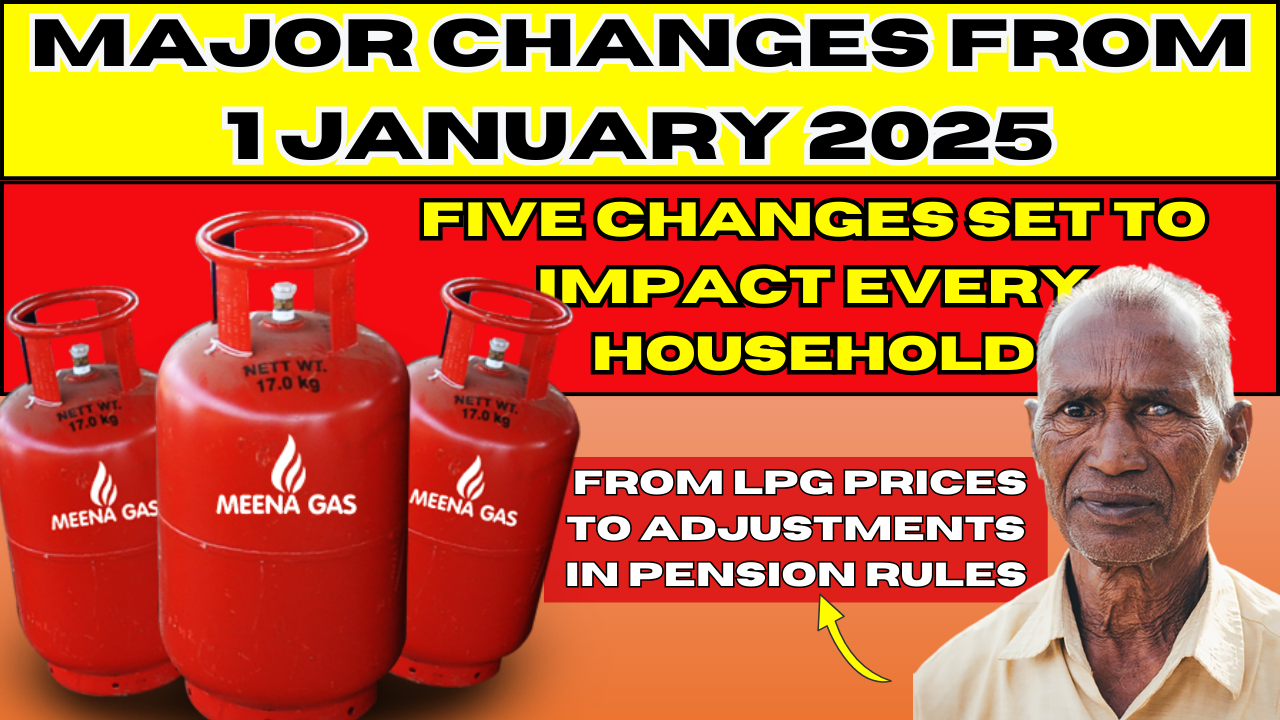As the calendar flips to a new year, January 1 often ushers in several policy and regulatory changes that directly affect households and individuals. This year is no exception. From modifications in LPG prices to adjustments in pension rules, Major Changes from January 1
Here are five significant changes set to impact every household and pocket
Let’s delve into the details:
1. Revised LPG Prices
The price of Liquefied Petroleum Gas (LPG), a staple fuel for Indian households, is reviewed monthly. On January 1, 2024, new rates will be announced. These changes depend on global crude oil prices and currency exchange rates. Over the past year, LPG prices have fluctuated significantly, affecting household budgets. If a reduction occurs, it will provide much-needed relief to families; however, a hike may further strain expenses. Consumers are advised to monitor updates from their respective gas agencies.
2. Changes in Pension Rules
Pensioners will face important updates in pension disbursement mechanisms. Many states are adopting a more digitized approach, requiring pensioners to complete their life certificate verification online through Aadhaar-based systems. This change aims to streamline processes and reduce fraud but may pose challenges for elderly individuals unfamiliar with digital platforms. Family members should assist pensioners to ensure compliance and avoid disruptions in monthly payouts.
3. Revision in Bank Interest Rates
January marks a crucial period for banks to revise their interest rates on savings and fixed deposits. In response to Reserve Bank of India (RBI) policies, banks might adjust rates, impacting depositors and borrowers alike. For those relying on fixed deposit returns, a hike in interest rates would be beneficial, while borrowers might face higher loan EMIs. Individuals should consult their banks for updated rates and plan their finances accordingly.
4. Taxation Changes
The start of the new year often brings updates to tax-related policies, including Goods and Services Tax (GST) or income tax regulations. While the Union Budget is still weeks away, preliminary announcements or changes in compliance requirements may kick in from January 1. Small business owners, salaried employees, and self-employed individuals should review any notifications to ensure timely compliance and avoid penalties.
5. Updates in Electricity Tariffs
Electricity distribution companies frequently revise their tariffs at the beginning of the year. Major Changes from January 1 in tariffs will directly affect monthly electricity bills, particularly for urban households with high power consumption. State regulators will announce specific adjustments, considering factors like fuel costs and infrastructure expenses. Households should be prepared to adapt their consumption patterns to manage costs.
What Major Changes from January 1 Means for You
The collective impact of these Major Changes from January 1 emphasizes the importance of staying informed and proactive. Here are a few steps to mitigate the effects on your finances:
- Monitor Announcements Closely: Keep an eye on updates from LPG distributors, banks, and utility providers to avoid surprises.
- Plan Budgets Accordingly: Factor in potential increases in household expenses, such as LPG and electricity bills, while drafting monthly budgets.
- Seek Assistance for Digital Compliance: Elderly family members should be guided through digital pension verification processes. You can also seek help from local e-Seva centers or bank branches.
- Evaluate Financial Products: Review your bank’s updated interest rates to optimize savings and loan repayments.
- Adopt Energy-Efficient Practices: With potential hikes in electricity tariffs, investing in energy-efficient appliances or solar energy can yield long-term savings.
Looking Ahead
The adjustments taking effect from January 1 are part of broader efforts to align policies with economic goals and ensure efficient governance. While these Major Changes from January 1 may pose short-term challenges, they also offer opportunities for individuals to adapt and optimize their financial habits. Staying informed and prepared is the key to navigating this transition effectively.




